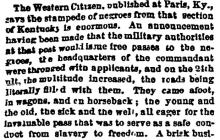THE NEWS.
The Western Citizen, published at Paris, Ky., says the stampede of negroes from that section of Kentucky is enormous. An announcement having been made that the military authorities at that place would issue free passes to the negroes, the headquarters of the commandant were thronged with applicants, and on the 24th ult, the multitude increased, the roads being literally filled with them. They came afoot, in wagons, and on horseback; the young and the old, the sick the well, all eager for the invaluable pass that was to serve as safe conduct from slavery to freedom. A brisk business must have been done; for in five days one thousand three hundred passes, averaging four percent to each pass, had been issued. The same excitement was witnessed at Lexington and other points in the State, where passes had been issued under Gen. Palmer’s order. It is probable that not less than twenty- five thousand negroes left Kentucky last week, under passes enabling them to go at will in search of employment.
The New Orleans Picayane learns from a well informed number of the Alabama press, that the people of the Sate have universally accepted the political situation and settled down in therefore peaceful pursuits. He thinks from observation in the interior of the country, that a much larger breadth of ground has been planted to cotton than generally supposal. The plant is everywhere healthy and vigorous, and no destructive insects have yet made their appearance amoug it. Corn is splendid, immense fields wave rich with, and the harvest will be much larger than ever gathered before. New Flour and wheat were long since in market, and the people will have plenty wherewith to drive the wolf from the door, and a surplus for market.
It is asserted that the annulment of the recent election held at Richmond was made with the consent of the President, which is not impeachable if the same representations were made to him as are set forth in General Turner’s order. A Washington dispatch says the correction of their representations, however, is zealously questioned, with here and Richmond, but even if correct it is argued that the few voters (a baker’s dozen) who were alleged to have been aced from the polls would not have changed the [illegible] one [illegible], as the same bracket would have been elected.
Letters from the South represent that a sorority of cotton seed and sugar cane is apprehended, and cases are resorted where the case alone has been sold for seed purposes at five hundred per acre. The sugar yielded will be very small and instead of exporting. Louisiana will have to spend largely urge imports for next year’s supply of her own great sample. Thus recent report of injury to the growing [illegible] the “army worm” is denied, and the crop, though a mere cypher compared with former years, is generally looking well.
"The News," Boston (MA) Herald, August 4, 1865, p. 4

